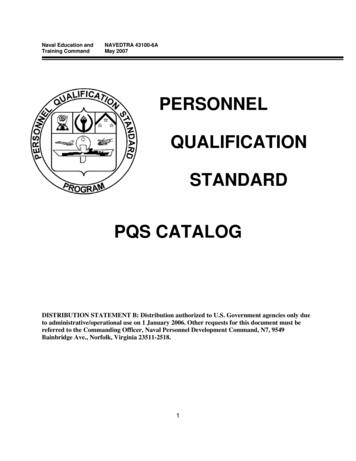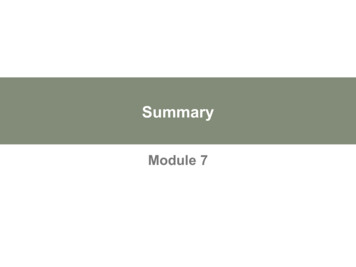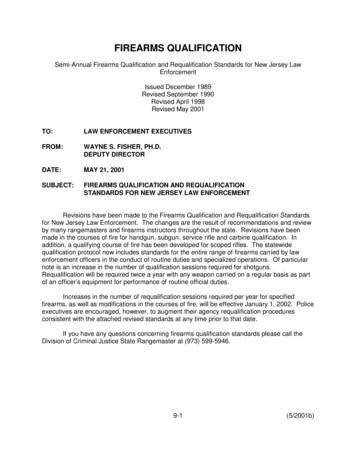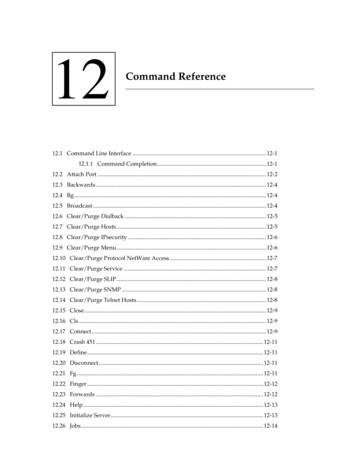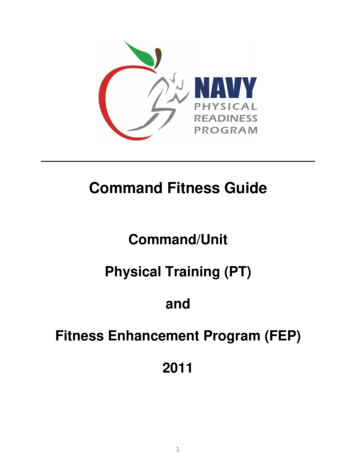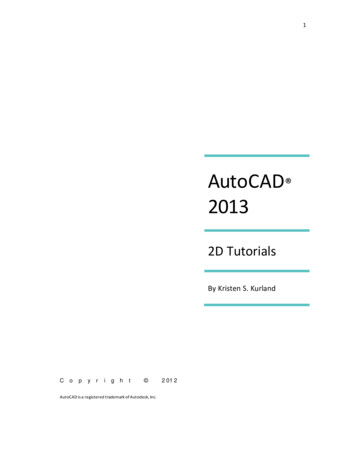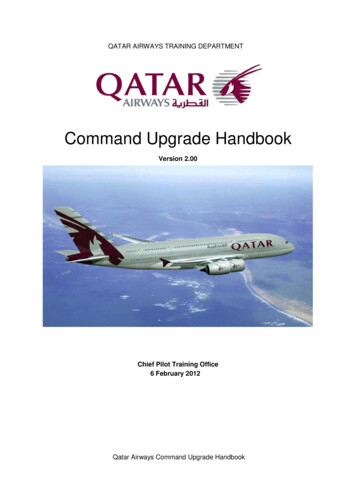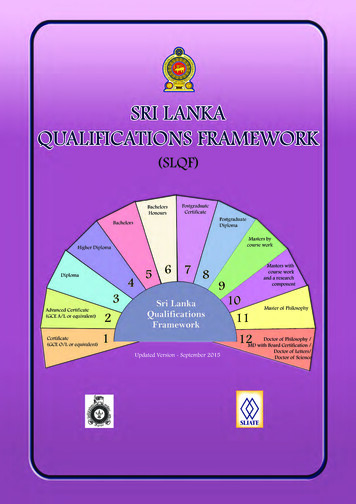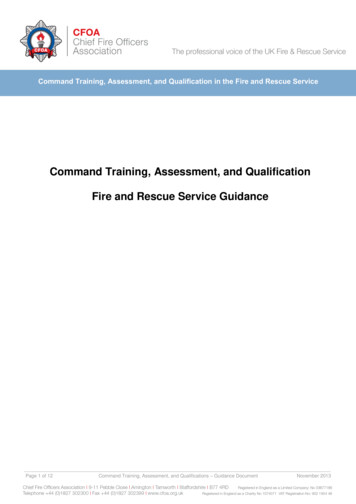
Transcription
Command Training, Assessment, and Qualification in the Fire and Rescue ServiceCommand Training, Assessment, and QualificationFire and Rescue Service GuidancePage 1 of 12Command Training, Assessment, and Qualifications – Guidance DocumentNovember 2013
ContentsIntroductionPurposeBackgroundNational Occupational Standards (NOS)Command QualificationsAwarding Centres and QualificationsAll Hazard CommandTactical AdviserNon-technical skills and PQAsDevelopment and maintenanceQuality AssuranceGlossaryPage 2 of 12Command Qualifications and Command Training – Guidance DocumentNovember 2013
IntroductionIn September 2013, the Operational Competence Guidance (OCG) document was launched as part ofthe Fire Professional Framework (FPF). The FPF is the outcome of a lengthy review of training anddevelopment requirements in the fire and rescue service that was previously presented as theOrganisational Competence Framework. The OCG was developed with the support of both theOperations Directorate and the People and Organisational Development (POD) directorates through asteering group that included both CFOA Ops and POD directors. The guidance provides UK Fire andRescue Services (UK FRS) with an operational competence framework for operational firefighters andcommanders to ensure that they can safely and effectively apply the necessary skills, knowledge andunderstanding in an operational environment. It is a guidance document for FRS and is not intended todictate or prescribe how competence should be achieved or how training and development programmesmust be delivered; that is a matter for each individual FRS.The OC guidance defines Core Operational skills and knowledge that a Firefighter or OperationalCommander requires, these are represented using the fire engine graphic below and include: Driving Command and Control Breathing ApparatusHazardous MaterialsWorking at HeightWater/Water SafetyExtrication/RescueCasualty CarePage 3 of 12Command Qualifications and Command Training – Guidance DocumentNovember 2013
PurposeThe following information refers to the topic of training, assessment and qualifications associated withthe skills and knowledge requirements of effective command and control.The National Command and Control Working Group (NCCWG), that sits within CFOA’s NationalOperations Committee’s Operational Effectiveness work-stream, produced this document titled‘Command Qualifications and Command Training in the UK Fire and Rescue Service’ to assist inproviding a recognised standard and model by which all UK FRS would train, develop and assess theirincident commanders.Command Qualifications and Command Training in the UK Fire and Rescue Service should bothinform and support the Operational Competence Guidance.Command Qualifications and Command Training in the UK Fire and Rescue Service provides: Background to command training. An overall framework for the delivery of command training with the aim of achieving consistentand standardised levels of command at all levels and in all UK FRS. An overview of the concept of an ‘All Hazards Commander’ and ‘All Hazard Command’ training. Detail of the relationship between technical and non-technical skills and the role they play ineffective incident command. An understanding of the importance of developing command skills: via acquisition, applicationand maintenance through continued professional development. Detail of the four levels of command and command qualifications. Detail of the importance of delivering the qualifications through an accredited Awarding Centre. Details of what constitutes a suitable assessor, with particular reference to advanced andstrategic level assessment.BackgroundSince 2007 Skills for Justice (subsequently Skills for Fire & Rescue, which now sits within Skills forJustice) have worked with CFOA to develop four levels of command qualification. These subsequentlyreceived approval by OFQUAL before being launched by Pearson, Edexcel and SFJ Awards. The resultis four levels of command, which are underpinned by four command qualifications applicable to the fireand rescue service.The development of command training across UK FRS has resulted in a variety of different commandcourses becoming available. Some courses are generic, whereas others have been focused onspecialist areas at specific levels of command responsibility (the CBRN Gold course for example). Inmany cases, the focus has been on the specialist technical area rather than on the subject or skillset ofcommand itself.Page 4 of 12Command Qualifications and Command Training – Guidance DocumentNovember 2013
The nationally recognised levels of command provide an opportunity to focus attention on commandcompetence itself, rather than concentrating on the incident types. The National OccupationalStandards (NOS) for Command and Control provide a structure that enables UK FRS to undertake anddeliver a consistent level of training to a common standard.National Occupational Standards (NOS)The NOS broadly consists of eight separate units across all four levels of command. Trainees, studentsand/or candidates are required to demonstrate competence in two broad areas set against GuidedLearning Hours.* Knowledge and Understanding is assessed in a controlled learning and developmentenvironment. This may be achieved in a number of different ways including oral or writtenexamination or through assignment work followed up with professional discussion. Command Competence is assessed in a simulated work environment covering both theIncident Commander and Sector Commander roles.*Guided learning hours are the times when a tutor, trainer or facilitator is present to give specific guidancetowards the learning aim for a programme. This definition covers lectures, tutorials and supervised studyin, for example, open learning centres and learning workshops. It also includes assessment by staffwhere learners are present. It does not include time spent by staff marking assignments or homeworkwhere the learner is not present.To ensure that the Command NOS remain current and fit for purpose, indicative review periods havebeen set for consideration by Skills for Fire and Rescue and the National Occupational Committee. It isimportant that the NCCWG and NCCUG are consulted in any further review process.Command QualificationsThere is a difference between being ‘qualified’ to command and being ‘competent’ to command. If anindividual passes a command assessment and gains the national qualification, he/she still needs toapply their learning and demonstrate competence. It is likely that this will be supported by continualdevelopment within his/her home UK FRS (the individual should be able to consistently demonstratehis/her ability to command against the standard). Individual UK FRS are responsible for themaintenance of such competencies through the monitoring of the individual’s performance.The four qualifications of Command form the basis for all development and assessment ofcommanders, with the four levels corresponding to the Qualification and Credit Framework(QCF) as detailed below: Level 1 Award in Initial Incident Command (QCF level 3) in Fire and Rescue Services.This level is typified by the officer who will demonstrate the ability to command and controloperations at a task-focused supervisory level, or to control a more serious escalatingincident in the early stages until relieved of command by a more senior commander. Level 2 Award in Intermediate Incident Command (QCF level 4) in Fire and RescueServices. This level is typified by a responding tactical commander who will demonstratethe ability to review and determine incident status, assume responsibility and take overcommand and control operations at middle manager level. Level 3 Award in Advanced Incident Command (QCF level 6) in Fire and RescueServices. This level requires an officer to tactically command the largest and mostserious incidents, usually on-scene or at an appropriate location, characterised by therequirement for tactical co-ordination and having reached the stage of utilising developedcommand support.Page 5 of 12Command Qualifications and Command Training – Guidance DocumentNovember 2013
Level 4 Award in Strategic Incident Command (QCF level 7) in Fire and RescueServices which covers the role of Strategic Command associated with the functions andresponsibilities of operations within a Strategic Co-ordinating Group. (The ladder diagrambelow illustrates how the four levels interconnect.) As indicated by the graphic above, levels 1, 2 and 3 cover technical operational commandroles from Crew Commander up to and including Chief Fire Officer. Level 4 is different inthat it is a qualification associated with the additional skills required to operate within aStrategic Co-ordinating Group in a multi-agency environment. The level 4 qualificationcan run parallel to level 3 depending on the needs of the individual UK FRS.The entry criteria for level 1-3 would be competence at the previous level.The entry criteria for level 4 would be a sound understanding and recognition of the roles andresponsibilities of operational and tactical command in a Fire and Rescue context.The diagram below illustrates how the relationship between core skills and knowledge and theapplication of these changes as a firefighter progresses through the command structure to StrategicCommander.Page 6 of 12Command Qualifications and Command Training – Guidance DocumentNovember 2013
A firefighter requires the full range of core skills and knowledge as well as knowing how the incidentcommand structure is applied. However, the Strategic Commander needs to understand the capabilitiesand limitations of operational skills and knowledge, but must be able to apply incident command skills ina complex, multi-agency environment and consider their potential political impact.Any on-going or future developments such as JESIP, Initial Operational Response Programme (IORP),NCAF or CBRNE should continue to be reflected within the four levels of command. The impact of anysuch changes on this guidance should be reviewed by the NCCWG.Due to the geographical size of some UK FRS areas, Principal Officers, Area and Group Managers areon occasion used as the (nearest) first officer mobilised to command level 1, 2, and 3 incidents. Wherethis is the case each respective UK FRS will need to be assured that the officers acquire and maintaincommand competence across each of the levels they will be required to take command responsibility for.Awarding Centres and QualificationsTo be able to award all or some of the four command qualifications a UK FRS must become anApproved Centre. Approval is obtained via an awarding body such as Pearson edexcel or SFJ Awards.It is possible that other non-FRS organisations will also become awarding centres.There are different ways of delivering the qualification. The important factor is ensuring that the guidedhours are met, for example, this may be done via a one-off course. Another option is for phasedlearning over a longer period through e-learning, development, professional discussion and simulation.It is important that the method chosen by the UK FRS fulfils the requirements of the awarding body.A UK FRS wishing to qualify as an awarding centre and award the command qualification must: Have appropriate physical resources (for example; equipment, IT, learning materials,teaching rooms) to support the delivery and assessment of the qualifications Provide systems to ensure staff delivering the qualifications receive continuing professionaldevelopment Be able to develop individuals prior to and following assessment Provide a means of standardisation and quality assurance of assessors Ensure assessors/staff involved in the process can provide evidence of their occupationalcompetence and expertise. (It may be difficult for some UK FRS to be able to do this due tolimited exposure to the assessment process). Collaboration between UK FRS could addressthis*.*The ability to provide suitable assessors (for the initial qualification) at levels 3 and 4 is particularly challengingbecause the Awarding Organisation requires evidence that the assessors: are able to demonstrate competency in the role that is being assessed understand the relevant NOS for the role being assessed can demonstrate currency by having completed the required number of assessmentsA number of UK FRS utilise assessors who are of a lower or equivalent rank to those being assessed (this is commonpractice in other public sectors.)Recognition of Prior Learning (RPL) may be appropriate as an alternative for those currently in role.RPL requires the candidate to provide sufficient evidence to meet the assessment criteria within thequalification and again that is for the individual Fire and Rescue Service to determine. As an example aPage 7 of 12Command Qualifications and Command Training – Guidance DocumentNovember 2013
UK FRS could accept 2 years’ experience and successful completion of an internal command course asan alternative to the level 3 qualification.It is strongly recommended that newly promoted officers should commence working towards theappropriate qualification at the earliest opportunity.In order to support the qualification, consideration should be given to the value of peer review. This willensure a standardised approach across local, regional and ultimately national levels.Many FRS work in regions and may want to work collaboratively through a regional centre usingcommon resources and saving on costs.All Hazard CommandThe four levels of command apply to an ‘all hazards’ approach. This means that the commander will beprovided with the skills and knowledge to command any incident at the appropriate level. The skills andknowledge associated with command should be transferable to any given incident the commander mayencounter, e.g. Hazmat, MTFA, Fire, CBRNE etc. As part of acquiring the respective commandqualification, each candidate should be exposed to, and assessed against, a range of scenarios, eithersimulated or via practical exercises relating to: FireRescueHazardous Materials and Environmental ProtectionThis means a commander first and foremost acquires and develops the skills and knowledge tocommand any incident. The commander may then need additional specialist information specific to theincident; this is likely to be provided by an adviser (who possesses specific technical skill sets andinformation). Each UK FRS will need to determine the type and number of Tactical Advisers (specialistsubject matter advisers) they need.Tactical AdviserTactical Advisers are personnel who are trained, qualified and competent in specialist fields, providingadditional technical and tactical guidance that is specific to the incident in order to inform the IncidentCommander’s tactical considerations, priorities and objectives. To complement the principle of the AllHazard Commander it is vital that the Tactical Adviser is competent to the current nationally recognisedstandard. In order to satisfy this, National Occupational Standards (NOS) will need to be written bySkills for Fire and Rescue to ensure consistency is achieved across the FRS. Tactical Advisers need tosatisfy the requirements of any future National Occupational Standards.The following list includes some of the specialist technical areas where a UK FRS may wish to call uponthe services of a specialist adviser for the areas: Hazardous Materials and Environmental ProtectionTechnical RescueFire InvestigationWildfireCommand SupportInteragency LiaisonUrban Search and RescueCBRN (E) and DIMMTFABulk FoamMediaPage 8 of 12Command Qualifications and Command Training – Guidance DocumentNovember 2013
This document does not detail every specialist area that may be required; each UK FRS will determineits own local requirements.The newly-qualified commander then needs the opportunity to apply his/her skills over a range ofsituations. This could be provided within the UK FRS by attending exercises or simulations that exposethe commander to challenging events that enables them to apply their command skills across a range ofscenarios. This means that commanders will no longer be required to attend a wide range of specific /specialist command courses in areas such as CBRNE or MTFA.Part of the process in gaining a command qualification is for the individual commander to be aware ofhis/her limitations and the understanding of what a Tactical Adviser can contribute. The All HazardCommander courses will need to develop the Incident Commander to utilise the specialist knowledge ofthe Tactical Adviser.Non-technical skills and PQAsTechnical skills relate to the knowledge and understanding that an individual possesses in a subjectarea.Non-technical skills (NTS) relate to the attributes and behaviours of an individual when commandingan incident.Non-technical skills include: Situation AwarenessDecision MakingCommunicationTeamworkLeadershipManaging StressCoping with fatigueGood non-technical skills are essential. They enhance the ability of a Commander to effectively leadand control an incident. Effective non-technical skills will be required to achieve each level of CommandQualification. Without the ability to demonstrate these qualities in the simulated work environment, thecandidate is unlikely to pass the qualification.Although these qualities are to some extent inherent in an individual, UK FRS will need to develop theircommanders in this area. This would be achieved through a structured training and developmentprocess where instruction is provided prior to assessment.Non-technical skills and Personal Qualities and Attributes (PQAs) are closely related, as both arebehaviours inherent in an individual. Non-technical skills are especially relevant to command with PQAsbeing more traditionally associated with managerial roles. The importance of non-technical skills ishighlighted in the Health, Safety and Welfare Framework for the Operational Environment (link m/uploads/attachment pment and MaintenancePassing the relevant command qualification should be regarded as a first step. The individual needs theopportunity to apply his/her recently acquired command skills in a variety of situations such as: Page 9 of 12Operational IncidentsCommand Qualifications and Command Training – Guidance DocumentNovember 2013
Tabletop exercises / Tactical Decision ExercisesClassroom discussions to confirm technical knowledge prior to carrying out operationalsimulationsSimulator exercise (observation and participation)Station or locality drills/exercisesAttendance on relevant courses/development opportunitiesReview of case studies or technical related command documentsPersonal StudyIt is incumbent on the UK FRS to provide Commanders with the opportunity to continually develop theircommand portfolio at each level and across a range of incident types. The individual will, throughcontinued professional development, need to demonstrate and maintain their command competence andportfolio. Therefore, individual UK FRS need a structured training and development framework thatprovides their commanders with continued professional development.The qualification needs to be supported by the re-assessment of individuals to ensure they continue tomeet the standard; a minimum two yearly basis between re-assessments is recommended.Over a period of non-use/application, knowledge and skills decay may affect an individual’s ability tomaintain his/her competence. The training and assessment frequency identified by a UK FRS and thefire and rescue authority’s risk profile to continually develop commanders, providing assurance of theirmaintenance of competence, should take account of each individual’s ability to acquire and maintainskills.Maintenance of competence will be demonstrated through exposure at incidents, exercises and throughother methods of simulation. As incident numbers continue to fall, there will be greater reliance onexercises and simulation. This evidence would then be set against the training framework and stored asportfolio evidence.Portfolio evidence should dictate the assessment and training need, with certain maximum frequenciesset as safeguards. The assessment periods should also reflect the risk to the organisation, e.g. officerstemporarily promoted require more development and should be assessed more frequently.Quality AssuranceAs with any process of this nature it is vital that it is quality assured to ensure standards, consistencyand currency are maintained.The quality assurance of the qualification is a role fulfilled by the respective Awarding Organisation; UKFRS must also have their own quality assurance processes in place to ensure there isn’t a wide degreeof variance across the country and that each UK FRS is delivering a consistent and standardisedproduct.Page 10 of 12Command Qualifications and Command Training – Guidance DocumentNovember 2013
GlossaryAdvanced Incident Command - This level requires an officer to tactically command the largest andmost serious incidents, usually on scene or at an appropriate location, characterised by the requirementfor tactical co-ordination and of having reached the stage of utilising developed command support.All Hazards Command – This is a term to explain how the principles of command can be applied to anyincident type (with support from Tactical Advisers where appropriate).Pearson edexcel – Awarding Organisation.Guided learning hours – This is the time when a tutor, trainer or facilitator is present to give specificguidance towards the learning aim for a programme.IORP - Initial Operational Response Programme.Initial Incident Command - This level is typified by the officer who will demonstrate the ability tocommand and control operations at a task focused supervisory level or to control a more seriousescalating incident in the early stages until relieved of command by a more senior officer.Intermediate Incident Command - This level is typified by a responding tactical commander who willdemonstrate the ability to review and determine incident status, assume responsibility and take overcommand and control operations at middle manager level.IQA - Internal Quality Audit.JESIP – Joint Emergency Service Interoperability Programme.MTFA – Marauding Terrorist Firearms Attack.NCAF - National Co-ordination and Advisory Framework.NCCUG - National Command and Control User Group.NCCWG – National Command and Control Working Group.NOS – National Occupational Standards.NTS - Non-technical skills.OFQUAL - Regulator of qualifications, examinations and assessments.PQAs – Personal Qualities and Attributes.QCF - Qualification and Credit Framework.Recognition of Prior Learning (RPL) In this context refers to UKFRS assuring themselves that existingCommanders can meet the assessment criteria using the knowledge and skills that they alreadypossess, as an alternative to gaining the qualification.Skills for Fire and Rescue –Skills for Fire and Rescue (employer led body for FRS) forms part of theJustice Sector Skills Council (JSSC) and works in partnership with UK FRS and CFOA.SfJ Awards – Awarding Organisation.Page 11 of 12Command Qualifications and Command Training – Guidance DocumentNovember 2013
Strategic Incident Command – This level covers the role of Strategic Command associated with thefunctions and responsibilities of operating within a Strategic Co-ordinating GroupTactical Adviser (TA) - an individual who is an expert in a particular area or topic with the skills to giveadvice on tactical considerations.UK FRS - United Kingdom Fire and Rescue Service(s).Page 12 of 12Command Qualifications and Command Training – Guidance DocumentNovember 2013
Background to command training. An overall framework for the delivery of command training with the aim of achieving consistent and standardised levels of command at all levels and in all UK FRS. An overview of the concept of an 'All Hazards Commander' and 'All Hazard Command' training.

